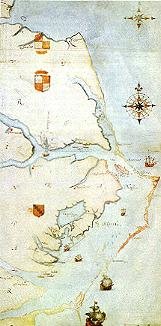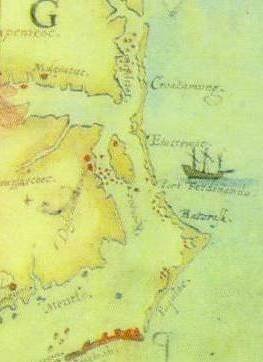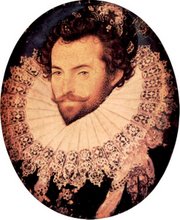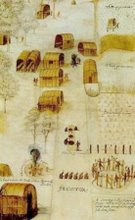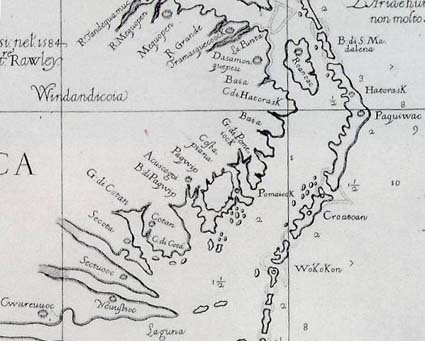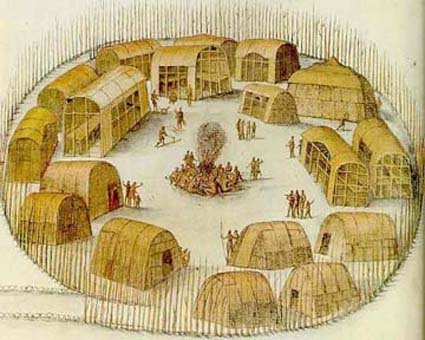There is also a probability that the younger men left on Roanoke Island in 1587 did not rejoin the main body of settlers but lived instead with the Croatoan (Hatteras) Indians of the Outer Banks. There are bound to be differences of opinion as to what weight should be given each item of direct and indirect evidence. If new solutions are to be found, they must rest either on new documents (the finding of which is unlikely, if not impossible) or, most probably, on archaeological discoveries. If the Lost Colonists lived some twenty years on a site that it is suggested, was well inland near the present Elizabeth River in Virginia, they are bound to have left traces that Powhatan is unlikely to have destroyed completely. Such a discovery would be thrilling for all North Carolinians and Virginians, but there is no assurance that it will ever take place. Nevertheless, it is our best hope of solving what appears to be the crucial element in the mystery of the Lost Colonists and their fate."
Thursday, November 8, 2007
The Lost Colonists Their Fortune and Probable Fate
by David Beers Quinn
"The people of England, indeed of the Western world, learned about North America; because books were published based on what Raleigh's men discovered, they could soon read for themselves of the natives and the promise of strange and wonderful resources.
The Lost Colonists provide one of the first and most challenging mystery stories of American history. They may also present to us the first example of the assimilation of people from the British Isles with Native Americans, a result that did not take place to any great extent in eastern North America or, indeed, elsewhere in that great area. The writer on this subject has to be as accurate as he can, yet willing to speculate. There are clear factual accounts of the voyage of the colonists under the leadership of John White in 1587 and their temporary establishment on Roanoke Island. There is equally clear evidence that when John White returned to the island in 1590 the settlers had gone. All traces of their having lived there during the previous three years had disappeared. Only a newly built defensive fortification remained on the island. No person certainly belonging to the 1587 colony is known to have been seen again by a white man.
We have, however, clear evidence that white settlers identified as having come from Roanoke were living in the area between the Elizabeth River and what is now Cape Henry, in modern Virginia, during the twenty years after their presumed departure from Roanoke Island. We have equally positive evidence that colonists were killed by the Virginia Indian ruler Powhatan shortly before Jamestown was founded. But not all North Carolinians are prepared to accept this evidence because it is indirect and occurs a few years, perhaps only two or three years, after the event.
Intensive searches-but not intensive enough, we might think-were made for survivors of the colony in 1608, and seven persons were heard of as having escaped the killing and reached the Chowan tribe not far from the head of Albemarle Sound in North Carolina. Held incommunicado by the Indians there, they were lost sight of and finally forgotten by the Virginia settlers. It can be conjectured with a degree of probability that some of the colonists remained with the Europeanized Indian Manteo on the Carolina Outer Banks near modern Cape Hatteras. All trace of these people was lost, however, and their subsequent fate is totally unknown, though speculation has suggested that they formed an element in later Indian populations on the Carolina sounds.
In assimilating the materials that survive on the Lost Colonists and their fate, there are many gaps in our documentation. These must be filled by working conjectures. Historians, especially of earlier periods of history, have to make assumptions that blend the materials at their disposal into a coherent story while carefully admitting where they are and are not relying directly on documents (which may be good or only imperfect evidence). Otherwise they could not make any sense of their reconstruction of an often poorly documented past. In what follows, assumptions have been made and conjectures proposed that are the best that one historian can do with the materials at his disposal. They do not lead to any dramatic conclusion except that the great majority of the Lost Colonists, after nearly twenty years of life alongside or mingled with the Indians living to the south of the Chesapeake Bay, across the border from North Carolina in modern Virginia, were wiped out in a massacre by the despotic ruler of the Indian tribes of tidewater Virginia. But our knowledge leads thereafter to strong indications, if not proof, that seven survivors remained in the possession (as slaves?) of a chief who dominated the Chowan River and possibly the lower reaches of the Roanoke River valley around 1608.
There is also a probability that the younger men left on Roanoke Island in 1587 did not rejoin the main body of settlers but lived instead with the Croatoan (Hatteras) Indians of the Outer Banks. There are bound to be differences of opinion as to what weight should be given each item of direct and indirect evidence. If new solutions are to be found, they must rest either on new documents (the finding of which is unlikely, if not impossible) or, most probably, on archaeological discoveries. If the Lost Colonists lived some twenty years on a site that it is suggested, was well inland near the present Elizabeth River in Virginia, they are bound to have left traces that Powhatan is unlikely to have destroyed completely. Such a discovery would be thrilling for all North Carolinians and Virginians, but there is no assurance that it will ever take place. Nevertheless, it is our best hope of solving what appears to be the crucial element in the mystery of the Lost Colonists and their fate."
There is also a probability that the younger men left on Roanoke Island in 1587 did not rejoin the main body of settlers but lived instead with the Croatoan (Hatteras) Indians of the Outer Banks. There are bound to be differences of opinion as to what weight should be given each item of direct and indirect evidence. If new solutions are to be found, they must rest either on new documents (the finding of which is unlikely, if not impossible) or, most probably, on archaeological discoveries. If the Lost Colonists lived some twenty years on a site that it is suggested, was well inland near the present Elizabeth River in Virginia, they are bound to have left traces that Powhatan is unlikely to have destroyed completely. Such a discovery would be thrilling for all North Carolinians and Virginians, but there is no assurance that it will ever take place. Nevertheless, it is our best hope of solving what appears to be the crucial element in the mystery of the Lost Colonists and their fate."
by David Beers Quinn © 1984 by the North Carolina Division of Archives and History Permission granted to use electronically for educational purposes, September 6, 2000
Posted by
Historical Melungeons
at
11/08/2007 01:59:00 PM
![]()



